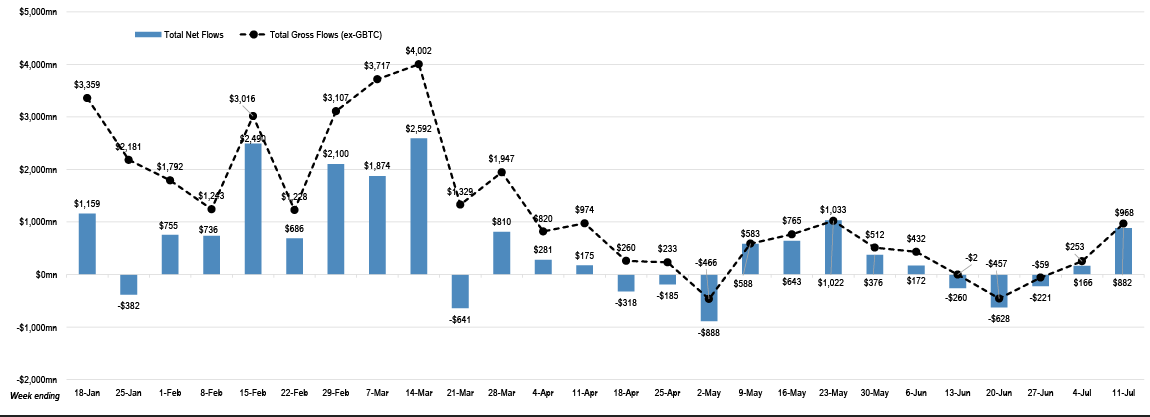Table of Contents
Just when Bitcoin's slump worried investors, the crypto's new avatar as a 'traditional asset class' and a good long-term bet came into view, with strong flows into US Bitcoin ETF funds stabilising the top token.
While Bitcoin's volatility topped that of stocks and gold, there is a clear pattern of that gap narrowing significantly this year. With the crypto falling to $53,602 on July 5, caused by worries about potential sell-offs from creditors of the defunct Mt. Gox exchange and the sale of confiscated coins by Germany, those buying the dips poured in cash, a trend that bodes well for a less volatile token in the long run.
Bitcoin saw inflows of $1 billion into 11 exchange-traded funds (ETFs) last week, as it climbed to $58,000 into the weekend. The next trigger came over the weekend from what is widely called the "Trump trade."
It appears highly likely that the 'Trump trade' will continue to gain momentum as global financial markets resume operations after the attempted assassination of Donald Trump.
Over $300 million was added into the ETFs on Monday. BTC now sits at around $63,000.
ETF Flows, Narrowing Volatility & More
The question on almost everyone's mind is the sudden change in Bitcoin price this year – what is making Bitcoin less volatile despite being categorized as a risk asset?
Many in the market believe that the ETFs offered by industry heavyweights provide a stable demand that can help keep prices from raging. Six-month-old portfolios have accumulated assets of over $51 billion, which is more than 4% of the Bitcoin supply.

Bitcoin ETFs had their strongest inflows in over a month after the price of the world's largest cryptocurrency hit its lowest level since February a week ago. Dip buyers came back in a major way.
The spot Bitcoin ETF market brought in $882 million for the week ending July 11, with daily averages of $175 million, as reported by JPMorgan. Withdrawals have reached that level since the period concluded on May 23.
The jump, with $403 million and $361 million, respectively, was driven by the Bitcoin funds of BlackRock and Fidelity. At the same time, Grayscale's ETF lost about $87 million, continuing its run of negative cash flow.

Bitcoin ETFs lost more than $1.1 billion over a three-week losing streak after which last week marked the second straight period of fund increase following the $166 million inflows in the week prior.
The largest holders of these assets are hedge funds and wealth advisors. Compared to the individual investors who were enticed by cryptocurrency as a get-rich-quick trade in the early years, these specialised institutions stand out.
Especially as the Bitcoin funds are from some of the world's top investment bankers like Blackrock and Fidelity.
This year, markets have seen a general trend towards smaller Bitcoin swings, albeit they are still greater than those for assets like gold or equities.
For instance, over the past 180 days, the difference between the token's and gold's realised volatility measures has shrunk to 28 percentage points, a reduction of more than 100 percentage points.
This year, the fall in Bitcoin volatility compared to gold or stocks is also the narrowest in the last decade.

Tokens like Solana and the meme-crowd favourite Dogecoin are just two of the many digital currencies available to speculators looking for wild price fluctuations. According to CoinGecko statistics, the proportion of Bitcoin in the $2.2 trillion crypto market has decreased from 90% a decade ago to 50%, which may be explained by the increasing prevalence of smaller crypto assets.
With support from US ETFs, Bitcoin reached a record high of $73,798 in March before retracing its losses. According to research company Kaiko, ETFs also increase market liquidity and concentration of trading activity during US market hours. Bitcoin funds began listing in Australia and Hong Kong, following the launch of offerings in the United States in January.
Turning Point for Fed Rates?
The largest bond market in the world is reaching a turning point. US Treasuries are recouping their losses from 2024 as investors begin to warm up to the prospect of three interest rate cuts this year.

Last week, US government debt showed all the signs of optimism about easing inflation. Yields across the curve fell as data was perceived as supporting the idea of lower borrowing costs as early as September.
Two-year Treasury rates fell 15 basis points to 4.45%, their lowest level since March. These maturities are more affected by Federal Reserve monetary policy than longer-dated ones.

While policymakers await further proof of a slowdown in inflation, authorities are growing more cautious about possible dangers to the labour market, Fed Chief Jerome Powell told legislators this week.

The consumer price index rose in June at its slowest rate in three years, according to statistics released on Thursday, which boosted bond prices. Market players were more concerned about a decline in consumer mood, even if data released on Friday showed US producer prices rose a little more than expected in June.
This adds to the positive mood for digital assets as Fed rate cuts are predicted to be the next trigger for a leg up for cryptos.









